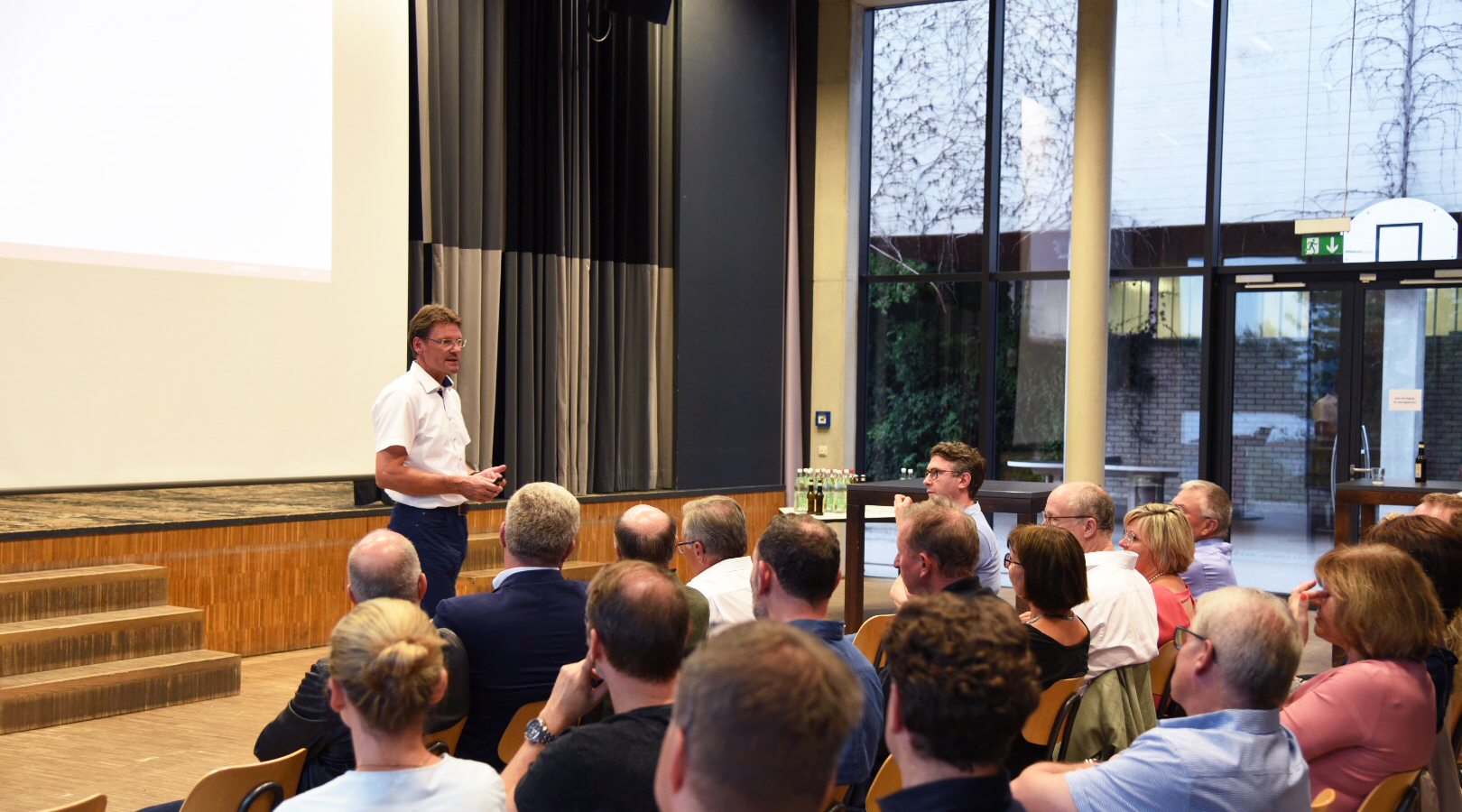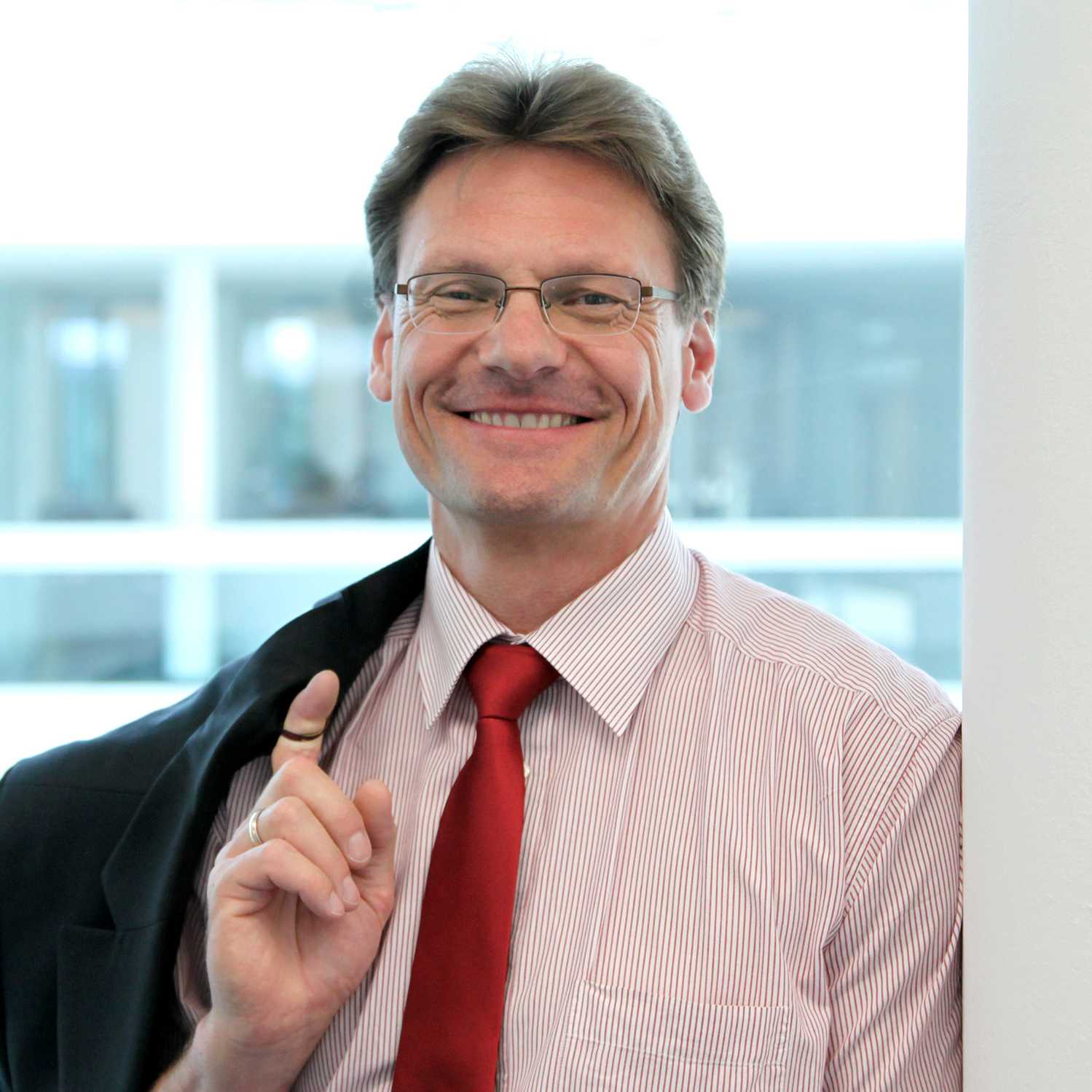"A little owl with a big meaning"
His 27 years in the pharmaceutical industry have prepared Dr. Ulrich Thibaut well for teaching in many respects. Nevertheless, teaching remains a persistent challenge for him. The fact that the pharmacist and pharmaceutical chemist is on the right track in this respect has now been confirmed to him by the ETH Student Association (VSETH) who awarded him with the Golden Owl. In this personal interview Ulrich Thibaut talks about personal strengths and weaknesses, failure and success.
As a young pharmacist, Ulrich Thibaut had great role models: One of his relatives had invented the well-known drug Buscopan. Thibaut was then involved when the stomach drug Pantoprazole started its triumphal march at Byk Gulden, later ALTANA Pharma AG (today: Takeda), and at the age of 40 he was already successfully managing 500 employees in a company with 2 billion sales. In various management roles, he had to build up departments, restructure them, deal with competitive battles and introduce measures to strengthen trust between company locations scattered all over the world before he came to ETH Zurich in 2017. What has this to do with teaching? In Ulrich Thibaut’s case, quite a lot, as becomes clear in the following interview.
Managing 500 employees so young was no small feat. What was your recipe for success?
I only succeeded through good collaboration and because I was aware of my strengths and weaknesses. My strength is building good teams, communicating well and explaining why certain projects may proceed and others do not. Regarding structured, mathematical-analytical thinking, others are more talented. I was able to choose my own team and staffed it accordingly with people who could complement my weaknesses with their strengths. That was a great opportunity, and I was also lucky.
At ETH, you built up the course “Drug Discovery and Development". Do you remember the beginnings?
The contact with ETH came about through Prof. Gerd Folkers. He supervised my scientific work during my doctoral studies at University Tübingen. When I left Octapharma AG, I received a teaching assignment at ETH and set up a block course there together with Prof. Jonathan Hall. The aim was to give the students an insight into what they would have to face if they were to pursue a career in pharmaceutical industry: how processes work, how decisions are made, etc. The course was well received by the master's students. Later, I was assigned a second course on “Communication and social skills as success factors for career”.
Can you tell us more about the communication course? How does this course work?
We did role-play and talked about personal values, for instance, what is important in life so that you make the right choices and have fun at work. I already had the feeling during the lecture that it was going well. It was very well received by the students. They really got stuck in, participated. It was a nice interplay, literally, and the positive feedback from the students probably led to the Golden Owl.
What role does your communications experience play in teaching?
As a board member in a big company, you always must address relatively large audiences, mainly in international meetings. In such a position, you eventually develop a certain routine of how to motivate people in large settings with the right words, and perhaps also address problems that exist everywhere and that you must solve. Perhaps I bring a certain ability to address people in such a way that they feel respected and have the feeling that they are making an important contribution. That's the only way a company works, that's part of its success.

Keyword success: What is your recipe for good teaching?
To be approachable, not boring people with a monologue. You have to ask for feedback, have conversations with the students, even approach one or the other during the lecture, elicit their opinion – and make the whole thing so interactive that no one drifts away during the lesson. In addition, you must make an effort to research things properly. The demands at ETH are high. You have to prove what you are telling, make comprehensible examples, involve the students in the teaching process. If people listen up and you notice that they are paying attention, I think you've done a good job.
Have you ever had any failings in communication or teaching?
Yes, there have been some. For example, when I was a new board member, I had to announce the withdrawal of an application for approval at a shareholders' meeting, and I wasn't adequately prepared. I was dithering around in front of about 500 people at the stock exchange in Frankfurt. I had been a board member for maybe a week and simply didn't know enough about how to deal with such situations, and I didn't have enough factual knowledge. As a result, the share price fell by around 12 percent. Of course, my colleagues on the Board where not amused.
The lesson was: good preparation is crucial. I assume that this also applies to teaching?
Yes, you should go into the lecture with a very solid foundation of knowledge, because there will also be questions and you should be able to answer the majority of them, otherwise you won't make a good impression. So always sit down and check your slides again. Also consider: Are there examples that you need to weave in – and keep the whole content up to date.
What challenges do you still face in teaching at ETH Zurich?
For example, the issue of redundancy. Some of the courses overlap in terms of content, and that doesn't go down well with the students. We have the problem at ETH that we have different levels of education in the master's program. The bachelors from ETH often already know a lot. But then we also have students from other universities or countries who we must bring on the same level. Inevitably, we have to accept repetitions. Finding the right balance is certainly an art, thus, you must maintain communication with the students.
So good preparation and communication are important. Any other tips for good teaching?
You should choose current topics that benefit young people, give concrete, real life examples. In addition, theory is important, but also soft skills of communication. It is important to explain that there are different levels of interests, for instance in a company. I think every teacher should have in mind that the students are here because they want to be successful in their careers. I think we need to communicate our life experience, what we've identified as success factors and disclose those. But also talk frankly about failures. In addition, one has to be authentic. That has helped me a lot. Young people notice whether there is someone in front who is being himself or whether he or she is playing a role. Authenticity promotes confidence and this is an important asset, that must be cultivated.
The students have shown their confidence in you by awarding you the Golden Owl. What does the award mean to you?
It is something very big for me. Already in industry, one of the best days of my life was when we won an important lawsuit and afterwards the chief executive came to our labs to show his appreciation. I compare the Golden Owl to that day because it's very special to be appreciated for something you've put a lot of effort into – in this case, into training young people.

“When the students say that the lecture was well presented and that they were able to learn something valuable, then I find that a wonderful, also very touching feedback that made me immensely happy. Yes, the Golden Owl is something very big in my life, absolutely, even if it is a small owl.”Ulrich Thibaut

Dr. Ulrich Thibaut graduated at Columbia University's Senior Executive Program. For more than 27 years he worked in the pharmaceutical industry. He has been board member for research and development at ALTANA Pharma AG, Drägerwerk AG & Co. KGaA, Octapharma AG and advisory board member at Glycotope GmbH. In 2017, he became a lecturer at ETH Zurich and in parallel founded a small startup. He still is a consultant to the biotech industry today.
